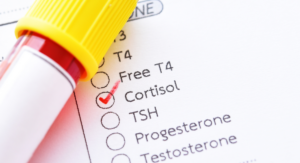You’ve been diligently counting calories, hitting the gym several times a week, and trying every diet trend you come across. You’re doing everything right.
But when you step on the scale, you see no change. Despite all your efforts, those stubborn pounds just won’t budge. Feeling frustrated and disheartened, you might even think you’re not working hard enough – and cut calories further or ramp up your workouts. Sound familiar?
If so, it might not be a matter of willpower or effort. It might actually be an imbalance in your hormones that influence your weight. In this blog post we’re going to explore this intricate connection between your hormones and your weight, what happens when this delicate balance is thrown off-kilter, and most importantly – what you can do to restore balance and kick those extra pounds to the curb.
Let’s start by defining exactly what hormones are and what role they play in your body.
What Exactly Are Hormones and What Do They Do?
Hormones are powerful chemicals produced by various glands in your body (like your thyroid, adrenal glands, and reproductive organs). Once released into the bloodstream, these hormones travel to different tissues and organs. These deliver vital instructions that regulate everything from your metabolism and energy levels to mood and sleep.
It can be helpful to think of hormones as your body’s messengers – ensuring that all the different parts of your system communicate effectively. Just like how a well-coordinated team needs clear communication to function optimally, your body relies on hormones to keep things running smoothly.
However, hormones aren’t isolated players, they work together in a delicate balance. When this balance is maintained, you feel energized, focused, and in control. But if even one hormone gets off kilter, it can set off a domino effect, disrupting this harmony. When that happens, the messages between your body’s systems can become confused – leading to a cascade of issues.1
One of the most noticeable effects of a hormonal imbalance is weight gain. To understand exactly how a hormonal imbalance can cause weight gain, it’s important to understand the key hormones that influence your metabolism and weight.
Key Hormones Involved in Weight Regulation
Weight regulation is a complex process that involves a network of hormones working together in harmony. It’s not just one or two hormones that dictate whether you gain or lose weight – it’s a finely tuned system where multiple hormones interact to control your metabolism, appetite, energy levels, and fat storage. Each hormone plays a specific role, but they all influence one another – creating a dynamic balance that your body relies on to maintain a healthy weight.

Some of the major players in this delicate interplay include:2,3,4
Insulin: The Blood Sugar Regulator
Insulin is a key player in your body’s ability to regulate blood sugar and, by extension, weight. Produced by the pancreas, insulin’s primary role is to help your cells absorb glucose (sugar) from the bloodstream, which they use for energy.
When you eat (particularly carbohydrates) your blood sugar levels rise, prompting your pancreas to release insulin. Insulin helps shuttle glucose into cells, where it can be used immediately or stored as fat for later use. However, when insulin levels are consistently high – due to a diet rich in sugars and refined carbs or other factors – your cells may become resistant to its effects.
This condition, known as insulin resistance, makes it harder for your body to manage blood sugar levels – which can subsequently lead to weight gain.
Cortisol: The Stress Hormone
Cortisol is often called the “stress hormone” because it’s released by the adrenal glands in response to stress. While cortisol is crucial for managing stress and maintaining energy levels, chronic stress can lead to consistently elevated cortisol levels – which can disrupt your weight regulation.
You see, high cortisol levels can increase appetite (particularly for high-calorie, sugary foods) and encourage your body to store fat – especially in the abdominal area. This stress-induced weight gain is part of the body’s survival mechanism. But in modern life, where stress is often chronic, it can contribute to unwanted weight gain and difficulty losing weight.
Thyroid Hormones: Metabolism Masters
Thyroid hormones, primarily thyroxine (T4) and triiodothyronine (T3), are produced by the thyroid gland and are critical for regulating metabolism. These hormones determine how quickly your body uses energy – making them the masters of your metabolic rate.
When thyroid hormone levels are balanced, your metabolism runs smoothly, burning calories efficiently. However, if your thyroid is underactive (hypothyroidism) or simply not performing optimally, your metabolism slows down – leading to weight gain and difficulty shedding extra pounds.
Estrogen and Progesterone: The Female Hormones
Both, Estrogen and progesterone are the primary female sex hormones, and they play significant roles in weight regulation, particularly in women. Estrogen helps regulate fat distribution, often influencing where your body stores fat – commonly in the hips, thighs, and buttocks during childbearing years.
As women age and estrogen levels decline (especially during menopause) fat distribution can shift, leading to more abdominal fat. Progesterone, which balances the effects of estrogen, can also influence weight.
Imbalances in estrogen and progesterone, such as those seen in conditions like polycystic ovary syndrome (PCOS) or during menopause, can contribute to weight gain and make weight loss more challenging.
Testosterone: The Muscle and Metabolism Powerhouse
Testosterone is often thought of as a “male hormone,” but it plays a vital role in both men and women when it comes to weight regulation. In both sexes, testosterone helps build and maintain muscle mass – which is crucial for keeping your metabolism running efficiently. More muscle means your body burns more calories (even at rest) – making testosterone a key hormone in the battle against weight gain.
For women, testosterone is often the “unspoken” hormone. Produced by the ovaries and adrenal glands, it helps with muscle maintenance and insulin regulation – two factors that directly impact weight. As women age and enter perimenopause or menopause, declining testosterone levels can lead to muscle loss and insulin resistance – making it harder to manage weight.
In both men and women, testosterone’s influence on muscle mass and metabolism means it plays a central role in your body’s ability to regulate weight and energy.
Leptin and Ghrelin: Hunger and Satiety Signals
These are hormones that regulate appetite and energy balance, often referred to as the “hunger hormones.” Leptin is produced by fat cells and signals to your brain that you have enough energy stored – helping to reduce appetite and prevent overeating. Ghrelin, on the other hand, is produced in the stomach and stimulates appetite, signaling to your brain that it’s time to eat.
When leptin levels are functioning properly, they help you maintain a healthy weight by curbing hunger when you’re full. However, in some cases, the body can become resistant to leptin’s signals, leading to continued eating despite having adequate energy stores.
Balancing these hormones is crucial for maintaining a healthy weight, as disruptions in their levels can lead to increased hunger, overeating, and weight gain. Now that you have an understanding of the key hormones that regulate your weight, you’re probably curious about how these messenger molecules can get thrown off balance in the first place.
So, What Causes Hormonal Imbalances That Can Cause Weight Gain?
Because everything in your body is interconnected, even a small disruption in one area can set off a chain reaction that affects your hormones. As a result, there are numerous factors that can spark an imbalance, including:
- Chronic Stress: Prolonged stress can lead to elevated cortisol levels, which can disrupt other hormone functions and promote fat storage – particularly in the abdominal area.
- Poor Diet: Diets high in refined sugars, unhealthy fats, and processed foods can lead to insulin resistance and affect hormones like leptin and ghrelin, disrupting hunger and satiety signals.
- Lack of Sleep: Inadequate sleep can lower leptin (which suppresses appetite) and increase ghrelin (which stimulates hunger), making it harder to regulate appetite and metabolism. Sleep disruption also alters your cortisol and insulin levels that are usually reset with good sleep.
- Environmental Toxins: Exposure to endocrine-disrupting chemicals (EDCs) like BPA, phthalates, and pesticides can interfere with hormone production and function – affecting metabolism and fat storage.
- Sedentary Lifestyle: Physical inactivity can contribute to insulin resistance secondary to muscle loss and negatively impact hormones that regulate metabolism and energy expenditure.
- Age and Life Stages: Natural hormonal shifts during puberty, pregnancy, menopause, or andropause can lead to imbalances that affect weight regulation.
- Thyroid Dysfunction: Conditions like hypothyroidism or hyperthyroidism directly affect metabolism and can lead to weight gain or loss, respectively.
- Medications: Certain medications, such as corticosteroids, antidepressants, beta blockers, benadryl and birth control pills, can interfere with hormone balance and metabolism, leading to changes in weight.
- Gut Health Issues: An imbalanced gut microbiome can affect hormone regulation, particularly insulin and cortisol, contributing to weight gain.
- Nutrient Deficiencies: Lack of essential nutrients like iodine, selenium, and vitamin D can impair hormone production (particularly thyroid hormones) leading to a slower metabolism and weight gain.
- Genetics: Genetic predisposition can influence how your body produces and responds to hormones, affecting weight regulation.
- Chronic Inflammation: Ongoing inflammation in the body can disrupt hormone signaling, particularly insulin and cortisol, leading to metabolic changes and increased fat storage.
So how can you address any underlying imbalances that might be throwing your hormones off-kilter and causing your body to pack on the pounds?
Tips for Balancing Hormones Naturally
Fortunately, there are some simple yet powerful ways that you can naturally support your hormones and help restore balance to this delicate network. Here’s what you can do:
- Eat Protein with Every Meal: Incorporating a source of protein into each meal helps stabilize blood sugar levels and supports the production of hormones that regulate appetite and metabolism. Protein-rich foods like lean meats, fish, eggs, beans, and legumes also help maintain muscle mass, which is essential for a healthy metabolism.
- Strength Train and Increase Muscle Mass: Engaging in regular strength training exercises (such as weight lifting, resistance training or bodyweight exercises) helps build and maintain muscle mass. Muscle tissue burns more calories at rest compared to fat tissue, which can boost your metabolism and improve insulin sensitivity – aiding in weight management.
- Manage Stress Effectively: As you know, chronic stress can lead to elevated cortisol levels, which can disrupt other hormones and contribute to weight gain. Incorporate stress-reducing practices such as mindfulness meditation, deep breathing exercises, yoga, or spending time in nature to help manage stress levels and promote hormonal balance.
- Prioritize Quality Sleep: Adequate sleep is crucial for hormone regulation. Poor sleep can disrupt hormones that control hunger and metabolism, making it harder to maintain a healthy weight. Aim for 7-9 hours of restful sleep per night and establish a consistent sleep routine to support hormonal health.
- Eat a Balanced Diet: Focus on a diet rich in whole, unprocessed foods. Include plenty of fruits, vegetables, whole grains, and healthy fats like avocados, nuts, and olive oil. Avoid excessive consumption of refined sugars and unhealthy fats, which can lead to hormonal imbalances and weight gain.
- Stay Hydrated: Proper hydration supports overall health and helps maintain hormonal balance. Drink plenty of water throughout the day and limit your intake of sugary drinks and excessive caffeine – which can affect hormone levels and metabolism.
- Incorporate Omega-3 Fatty Acids: Omega-3 fatty acids (found in fatty fish like salmon, flaxseeds, and walnuts) have anti-inflammatory properties that can help regulate hormones and support metabolic health. Including these in your diet can aid in balancing hormones and managing weight.
- Support Gut Health: A healthy gut microbiome plays a significant role in hormone regulation. Consume probiotic-rich foods like yogurt, kefir, and fermented vegetables or even incorporate a daily probiotic supplement to support gut health and improve hormonal balance.
- Monitor and Address Nutrient Deficiencies: Ensure you’re getting essential nutrients that support hormonal health, such as vitamin D, magnesium, and zinc. Consider incorporating a high-quality multivitamin or specific supplements if needed, based on your individual health needs and dietary intake.
- Be Mindful of Environmental Toxins: Environmental toxins can contain endocrine-disrupting chemicals (EDCs) that interfere with hormone production and function. Reduce your exposure to these EDCs by choosing organic produce, using natural cleaning and personal care products, and avoiding plastics that contain BPA and phthalates.
These natural strategies are undeniably foundational when it comes to regulating your hormones, enhancing your metabolism, and managing weight more effectively. But the truth is, sometimes hormonal imbalances may be so pronounced or complex that lifestyle changes alone aren’t quite enough to fully restore balance.

When to Seek Help for Hormonal Imbalances
Here are some signs that it might be time to seek professional guidance regarding hormone-related weight gain
- Persistent Weight Gain: If you’re experiencing unexplained or persistent weight gain despite making lifestyle changes. It could indicate a deeper hormonal issue that may require professional assessment and treatment.
- Severe Symptoms: Symptoms such as extreme fatigue, severe mood swings, significant changes in appetite, or difficulty losing weight may suggest a hormonal imbalance that goes beyond typical lifestyle-related issues.
- Unresponsive to Lifestyle Changes: When dietary adjustments, exercise routines, and stress management techniques have not yielded the expected results in managing your weight, it may be time to explore further options.
- Complex Health Conditions: If you have underlying health conditions like hypothyroidism, polycystic ovary syndrome (PCOS), or menopause-related symptoms that are affecting your weight, professional guidance can be essential in managing these conditions effectively.
And one key strategy that is often utilized to address hormonal imbalances is a therapy known as hormone replacement therapy.
How Hormone Replacement Therapy Can Help With Weight Gain
Hormone replacement therapy or HRT is exactly what it sounds like – a treatment designed to replace and replenish hormones that your body may be struggling to produce on its own. By supplementing these essential hormones, HRT aims to restore balance and address various health issues – including weight gain – related to hormonal imbalances. Here’s how HRT can support your efforts to manage weight effectively:
- Restoring Hormonal Balance: HRT can help restore balance to hormones that are out of sync, such as estrogen, progesterone, or thyroid hormones.
- Improving Metabolic Function: Hormone imbalances often affect metabolic processes. HRT can improve metabolic function by ensuring that hormone levels are optimized, which can help in managing weight more effectively.
- Reducing Symptoms: HRT can alleviate symptoms associated with hormonal imbalances, such as hot flashes, night sweats, and mood swings, which can indirectly support weight management by improving overall well-being and reducing stress-related weight gain.
- Personalized Treatment: A healthcare provider can tailor HRT to your specific needs – adjusting dosages and types of hormones to address your unique hormonal profile and weight-related concerns.
By addressing hormonal imbalances and optimizing hormone levels, HRT can play a crucial role in supporting weight management and overall well-being. If you’re struggling with weight gain despite your best efforts, HRT might offer a valuable solution to help you achieve a healthier balance and reach your weight management goals.
Are You Grappling With Weight Gain Related To A Hormonal Imbalance?
Dealing with weight gain related to hormonal imbalances can be incredibly frustrating and disheartening. It’s tough to put in the effort with lifestyle changes and still struggle with weight issues that seem beyond your control.
But you don’t have to face this challenge alone. At Activated Health and Wellness, we offer hormone replacement therapy along with a comprehensive, personalized approach to help identify and address the root causes of your weight gain, hormonal imbalances, and any other symptoms you may be experiencing. Our team is dedicated to creating a 100% personalized plan to help you get back to feeling like yourself again.
Call our clinic today at 480-571-1000 to schedule your consultation. Take the first step towards a more balanced and vibrant you!

Resources:
- Hormones: What They Are, Function & Types (clevelandclinic.org)
- A Review of Weight Control Strategies and Their Effects on the Regulation of Hormonal Balance – PMC (nih.gov)
- Endocrine Changes in Obesity – Endotext – NCBI Bookshelf (nih.gov)
- Long-Term Persistence of Hormonal Adaptations to Weight Loss | New England Journal of Medicine (nejm.org)










